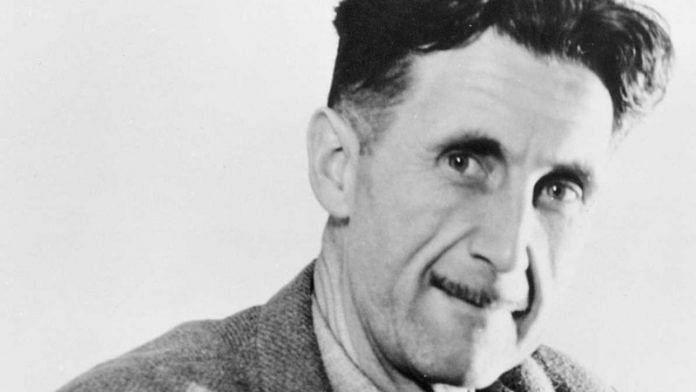On his 69th death anniversary, ThePrint takes a look at the man who was deeply committed to the sorrows of his times, and beyond.
“Big brother is watching you” is one of the most oft-quoted lines from George Orwell’s iconic 1984. Many of us are beginning to accept now, rather begrudgingly, that ‘Orwellian’ surveillance is no longer a rarity. But the English novelist and essayist warned about the dangers of totalitarianism and the digital age decades ago.
All writers of relevance are marked by a certain ‘X factor’. For Orwell, it was his ability to foretell the ominous future and use inventive vocabulary to articulate his concerns.
Orwell’s writing was so fiercely political, that his work could be seen as the near perfect embodiment of the expression, “personal is political”.
On his 69th death anniversary, ThePrint takes a look at the man who was deeply committed to the sorrows of his times, and those which he knew would plague the times after him.
Also read: Sarat Chandra Chattopadhyay, the creator of some of Indian literature’s most iconic women
Why George Orwell wrote
Besides his novels that have acquired an iconic status — A Clergyman’s Daughter (1935), Animal Farm (1945), among others — over the years, his works engaged with the act of writing that help in understanding the author’s creative process.
In his essay Why I Write, Orwell listed four “great motives” for writing, which according to him, drive every writer: sheer egoism, aesthetic enthusiasm, historical impulse and political purpose.
For the early 20th century writer, having a political purpose drove him more than all the other motives.
“It is invariably where I lacked a political purpose that I wrote lifeless books and was betrayed into purple passages, sentences without meaning, decorative adjectives and humbug generally,” he wrote.
“The Spanish war and other events in 1936-37 turned the scale and thereafter I knew where I stood. Every line of serious work that I have written since 1936 has been written, directly or indirectly, against totalitarianism and for democratic socialism, as I understand it.”
His book, Homage to Catalonia (1938), shed light on his experiences in the Spanish civil war and why it left an indelible imprint on him.
Orwell was also extremely critical of the deterioration of the English language and the use of “bad English” by writers.
In his essay, Politics and the English language, Orwell argued why bad language and poor thinking abilities share a cause-and-effect relationship.
“A man may take to drink because he feels himself to be a failure, and then fail all the more completely because he drinks. It is rather the same thing that is happening to the English language. It becomes ugly and inaccurate because our thoughts are foolish, but the slovenliness of our language makes it easier for us to have foolish thoughts,” he wrote.
Personal life
Born as Eric Arthur Blair in 1903 in Motihari in Bihar, Orwell defined his family as “lower-upper-middle-class”. His grandfather, Richard Walmesley Blair, worked in the Opium Department of the Indian Civil Service, but soon after Orwell turned one, his mother took him and his sisters to England.
Much of Orwell’s childhood in England is captured in his childhood friend Jacintha Buddicom’s memoir, Eric & Us. She recalls the two sharing a collective interest in poetry growing up.
Orwell is known to have had several love interests, before he met Eileen O’Shaughnessy in 1935 who would become his first wife. Orwell and Eileen went on to adopt a three-week-old boy in 1944 they named Richard Horatio.
It was around this time that Orwell was writing 1984.
Novelist Thomas Pynchon wrote in the foreword to an edition of the book, “It is not difficult to guess that Orwell, in 1984, was imagining a future for his son’s generation, a world he was not so much wishing upon them as warning against.”
After Eileen passed away in 1945, Orwell was struck by loneliness and actively started pursuing other women. He married Sonia Brownell in 1949 but by that time Orwell’s health had begun succumbing to tuberculosis, a disease he was diagnosed with two years before that.
Orwell died in the wee hours of 21 January 1950 at the young age of 46.
Also read: With Malgudi Days, R.K. Narayan paid a timeless ode to the common man
Legacy
If Orwell’s words have been rendered timeless with repeated references to them, several homages and biographies of the writer have also been published since his death — despite the fact that in his will, he requested that no biography of his be written.
In 2000, Peter Davison edited and published the Complete Works of George Orwell, making it easier for the public as well as researchers to access his work. Jeffrey Meyers’ Orwell: Wintry Conscience of a Generation (2000) deep dives into the lesser visited and darker aspect of Orwell’s life.
Orwell’s birthplace and ancestral house in Motihari was also turned into a memorial of historical importance by the Bihar government in 2015.




Thank you for writing this article. I never knew he was born in Bihar. Orwell is one of my favourite classic writers.